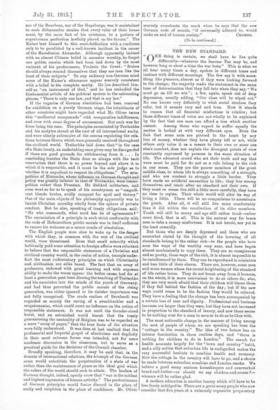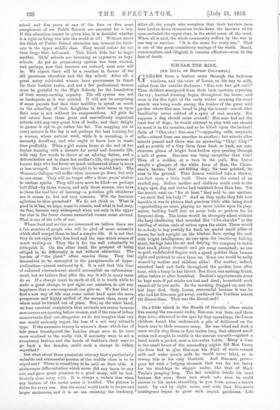THE NEW STANDARD.
" ONE thing is certain, we shall have, to lire quite differently—whatever the Income Tax may be, and however long or short a time the war lasts." This is what we all hear many times a day, spoken in different tones and instinct with different meanings. The few say it with some- thing like pleasure, almost as if they were looking forward to the change; the majority make the statement in the same tone of determination that they fall into when they say, We must go on till we win " ; a few, again, speak out of deep depression, usually adding, " Our class will be wiped out." No one knows very definitely to what social stratum they refer, but it sounds very sad and true. Now it stands to reason that all financial misfortune is relative ; but these different tones of voice are not wholly to be explained by the fact that one man can afford a loss which another cannot. Among those who expect to suffer equally the matter is looked at with very different eyes. Even the fact that some men are pierced to the heart by any loss of money, whether they have plenty left or not, while others only value it as a means to their own or some one else's comfort, does not explain the divergent points of view constantly expressed by persons in the same situation of life. The educated crowd who set their teeth and say that wars must be paid for do not as a rule belong to the rich in any sense. They are the poorer members of the great middle class, to whom life is always something of a struggle, and who are content to struggle a little harder. They have made no artificial necessities in life ; they live among themselves, and reach after no standard not their own. if they must en masse live still a little more carefully, they have no time to repine. Their whole world will alter its way of living a little. There will be no comparisons to accentuate the pinch. After all, it will still live more comfortably than it did within the recollection of its older members. Youth will still be merry and age still rather tired—rather more tired, that is all. This is the natural way for brave men to take a money misfortune. It hi not heroic, nor yet in the least cowardly.
But those who are deeply depressed and those who are somewhat elated by the thought of the lowering of all standards belong to the rather rich—to the people who have seen the ways of the wealthy very near, and have begun almost mechanically to copy them. They are so conspicuous and so pretty, these ways of the rich, it is almost impossible to be uninfluenced by them. They can be reproduced in miniature and lose little of their charm. There are, however, some men and some women whom the recent heightening of the standard of life rather bores. They do not break away from it because, on the whole, it is more convenient to do as others do; also, they are very much afraid that their children will blame them if they fall behind the fashion of the day ; but if the new ways could cease to be the fashion they would be relieved. They have a feeling that the change has been accompanied by a certain loss of ease and dignity. Professional and business incomes are larger than they wore, but they have not increased in proportion to the standard of luxury, and now there seems to be nothing over for a man to save or to do as he likes with.
The most noticeable change in the manner of living among the sort of people of whom we are speaking has been the "cottage in the country." The idea of two homes has an intense fascination in these restless days, and "there is nothing for children to do in London." The search for health accounts largely for the " town and country " habit, and a silly notion that suburban life is undignified makes the very successful hesitate to combine health and economy. Now the cottage in the country will have to go, and a choice be made between suburban sunshine and London smoke. We believe a good many anxious housekeepers and overworked bread-and-butter—or should we say chicken-and-cream P- winners will be rather glad.
A modern education is another luxury which will have to be less freely indulged in. There are a great many people who now consider that five years at a ruinously expensive preparatory
school and five years at one of the foar or five most conspicuous of our Public Schools are essential for a boy. if this education cannot be given him, it is doubtful whether it is right to bring him into the world at all! Without doubt the fetish of Public School education has lowered the birth- rate in the upper middle class. They would rather die out than forgo that hall-mark. This fetish bids fair to beget another. Girls' schools are becoming as expensive as boys' schools. As yet no preparatory system has been started, and perhaps, now that incomes are reduced, none ever will be. We expect there will be a reaction in favour of the Old governess eduCation and the day school. After all, a great many cultivated women have governesses to thank for their bookish tastes, and not a few professional women must be grateful to the High Schools for the foundation of their money-earning capacity. The old system was not so inadequate as it was painted. It will not be surprising if some parents feel that their inability to spend as much On the schooling of their daughters in their teens as upon their sons is not without its compensations. All girls do not return from these great and marvellously organized schools with any very great love of books, and their delight in games iis apt to go rather too far. The mapping out of every minute in the day is not perhaps the best training for a woman, whose natural work, while it is unending, is of necessity desultory, and who ought to know how to waste time profitably. When a girl comes home at the end of her boyish training with a distaste for social and domestic life, with very few words to throw at an adoring father, and a determination not to share her mother's life, the governess of former days who has borrie so much undeserved abuie is more or less avenged. She never thought to be wanted back. The Women's Colleges will suffer when incomes go down, but only in one sense. They will no longer offer a three years' shelter to restless spirits. They will once more be filled—or perhaps half filled—by those women„ and only those women, who have in them the real love of learning—a priceless gift whichever sex it comes to, but not very common. Will the feminist agitation be, thus quenched P We do not think so. What is good in it has, we hope,' come` to remain, and what .is had may, we fear, become very widespread when not only in the upper but also in the lower classes unmarried women must abound, That is one of the evils of war,
Where food and service are concerned we believe there are a fair number of people who will be glad of some necessity which shall compel them to lead a simpler life. It is not that they do not enjoy their tine food and the ease which comes of much waiting-on. They like it far too well voluntarily to relinquish it: On the other band, the prospect of being obliged to do differently is not without attraction. The burden of " the plant" often wearies them. They feel themselves to be entangled in the paraphernalia of hyper- civilization-s—almost enslaved by it. It is odd that this time of enforced retrenchment should accomplish an enfranchise- ment, but we believe that after the war it will in many cases do so. If a change must be made at all, it is worth while to make a great change, to put right our mistakes, to get any happiness that a rearrangement can give us. We fear that at first a new way of life may come rather hard upon the more Prosperous and highly skilled of the servant class, many of whom must be turned out of place.. tut, on the other hand, we hear constant complaints that servants are scarce because new careers are opening before women, and if the race of indoor Menservants died out altogether we do not imagine that any one would seriously regret the loss of a not very valuable type. If the excessive luxury in women's dress which has of late years transfigured the London shops were to be once more confined to the really rich, if necessity wero to set a sumptuary fashion and the hands of fashion's clock were to go back a few decades, could such a change be widely regretted P
But what about those pessimists who say that a particularly valuable and ornamental portion of the middle class is to be wiped out P There is something to be said on their side.. A picturesque differentiation which never did any harm to any one; and gave great pleasure to a good many, will be inci- dentally done away with. It is always a certain loss when any feature of the social scene is levelled. The picture is duller for every one. But the social world tends to larger and larger enclosures; and it is no use resisting -the. tendency.
After all, the people who complain that their barriers have been broken down themselves broke down the barriers which once secluded the upper class, in the strict sense of the word. When all is said, the whole community suffers by the war in one way or another, " It is the same for every one." That is one of the great consolatory sayings of the world. Banal, commonplace, and illogical, it remains effective—even in the face of death.



































 Previous page
Previous page